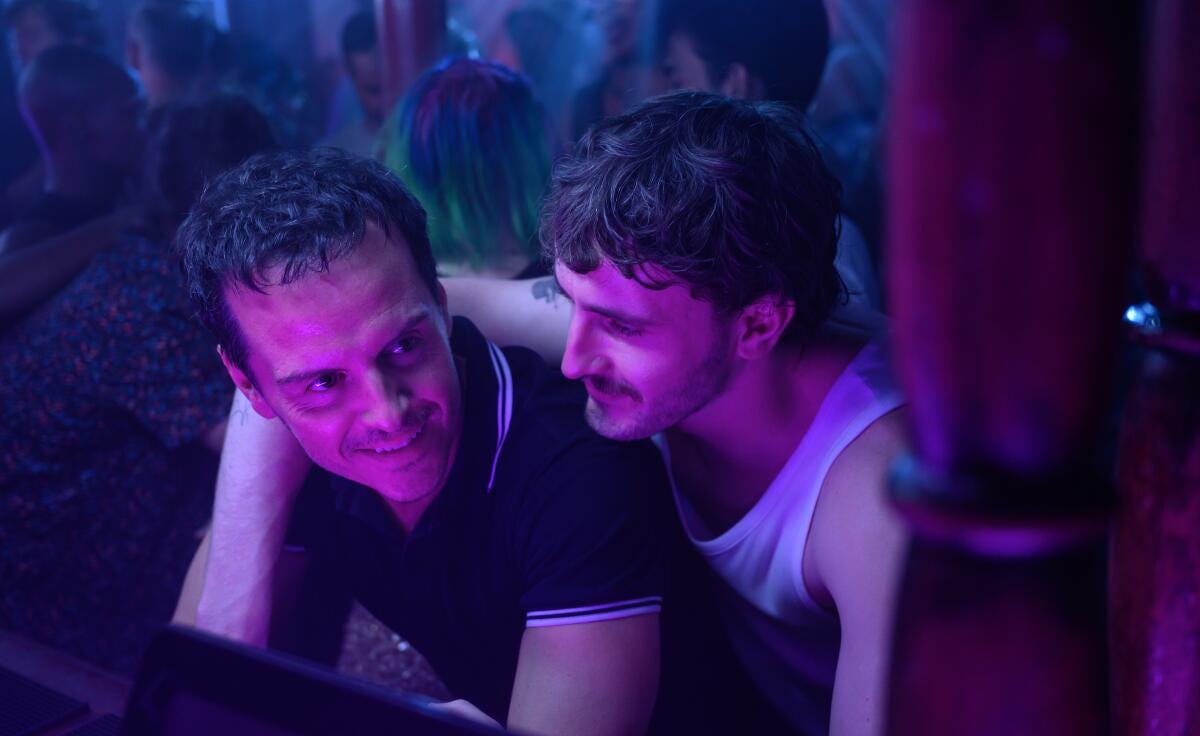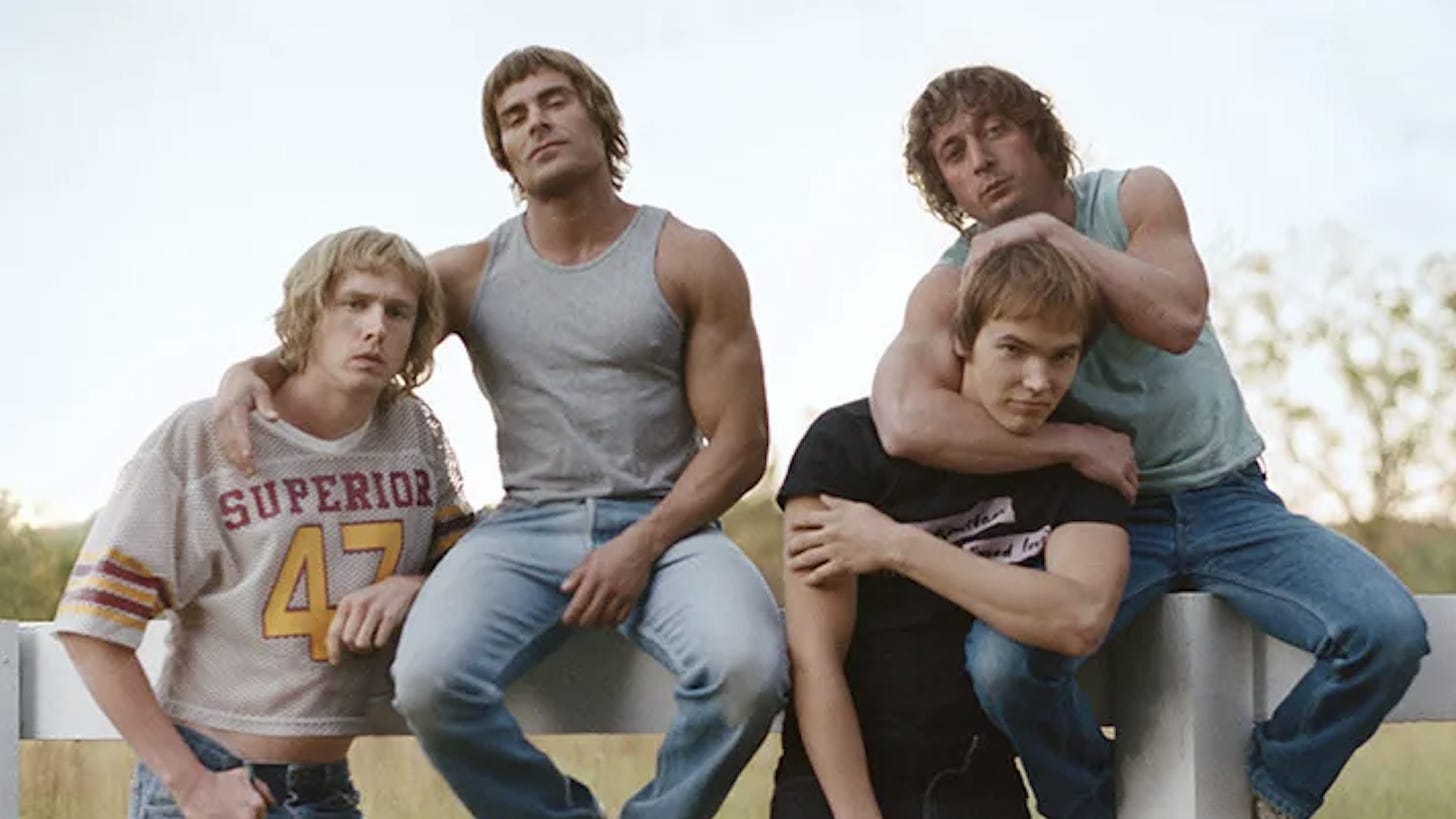In Review: 'All of Us Strangers,' 'The Iron Claw'
The good-movie express rolls on with Andrew Haigh's new supernatural love story and a dark biopic about the Von Erich family of wrestlers.
All of Us Strangers
Dir: Andrew Haigh
105 min.
Adam (Andrew Scott) lives in a corner of London that might as well be at the edge of the world. He can see the bustling city in the distance from his apartment, but it doesn’t seem to hold much interest for him. He’s one of the few residents of a newly constructed high rise seemingly designed for the lonely. It’s both residence and workspace for the fortysomething writer, a place to turn out TV scripts that he talks about dismissively when he talks about them at all. But that starts to change one night when, after a fire drill, he meets his younger neighbor Harry (Paul Mescal). Harry’s drunk and makes a sloppy pass that Adam politely, and reluctantly, bats away but the encounter seems to have stirred something in him. The next day, he opens a new file and taps in the words “EXT. SUBURBAN HOUSE 1987,” the first step of a journey to the past.
The latest film from Andrew Haigh (Weekend, 45 Years), All of Us Strangers adapts the 1987 novel Strangers by Japanese writer Taichi Yamada (who died a few weeks ago at the age of 89). Like the novel, it’s a ghost story, but Haigh treats its ghosts matter-of-factly. When Adam travels by train to the suburban town in which he grows up and meets his dad (Jamie Bell) and mom (Claire Foy), both parents and child understand the situation. They’re no longer among the living, having died in a car accident when Adam was twelve and though they’re pleased to see their grown-up son, they’re mostly content to continue an afterlife existence much like the lives they led before, puttering around the house, doing laundry, and going on the occasional errand.
But it’s the mundaneness of this life, with all of its unspoken acknowledgements and unfinished business, that makes Adam’s return home so powerful for him, and gives All of Us Strangers its emotional charge. Adam has somehow been given a second chance to explore the parents he’s lost and the world he left behind with adult clarity. The passing of the years haven’t made what he sees any less searing.
Even without knowing that Haigh used his own childhood home as Adam’s, the film would feel personal. Between visits with his parents, Adam begins a relationship with Harry that feels freeing—at the very least, it gets him out of his apartment—but also brings to mind fears of his youth that Harry never experienced: the need to be closeted, the understanding that his parents knew about his sexuality but never talked about it, the feeling that sex could be deadly, and the dissonance of a homophobic ’80s culture that nonetheless made heroes of sexually ambiguous pop stars. Scott’s understated performance drifts through a dreamy, melancholy landscape that blurs the lines between past and present until the line doesn’t matter anymore. The past is always with us. Its ghosts are never silenced. But it’s looking away that allows them to haunt. —Keith Phipps
All of Us Strangers opens in select theaters tomorrow before expanding.
The Iron Claw
Dir. Sean Durkin
132 min.
It’s revealing in more ways than one that The Iron Claw, a biopic about the Von Erich family of wrestlers, recounts a cascading series of tragedies so immense that writer-director Sean Durkin actually has to cut out an entire tragedy. For dramatic purposes, there’s already so much sadness in the Von Erich’s lives that to include another one that actually happened would seem like overkill and push the limits of a drama that already feels stretched thin. Such is the untidiness of real stories. ere that presents Durkin with the daunting challenge of trying to eke a story of brotherly love and redemption from a decade so grim that a mother worries she’s outworn her mourning dress. One fewer death helps mitigate the heaviness, but even a Von Erich would have trouble bench-pressing the weight that remains.
The title refers to the family’s signature wrestling hold, devised by imposing patriarch Fritz Von Erich (Holt McCallany), who had made his way through the circuit in the ‘60s and ‘70s mostly by playing the heel. (That the real Fritz made his name as part of a tag-team duo of villainous Nazis is also left out of this film.) The image of a wrestler pressed to the mat by a powerful claw is a natural visual metaphor for a film about the pitiless hand of fate, which came to be known as “the Von Erich curse.” But as the film opens on the cusp of the Reagan ‘80s, the Von Erichs are on the rise, with Fritz and his religiously devoted wife Doris (Maura Tierney) having raised several beefy young athletes with championship potential.
Having this stable of talent gives the Von Erichs a hook—not many families can supply a tag-team trio, much less one this elegantly synchronized—but Fritz wants a World Championship belt in the house, so there’s a lot of competition for individual glory. (He is not joking when he says he ranks his boys.) First up is Kevin (Zac Efron), perhaps the most exuberant worker of the bunch, who gets enough attention as part of Fritz’s promotion, the Dallas-based World Class Championship Wrestling, to earn an exhibition with the champ. But subtle weaknesses in Kevin’s performance lead Fritz to tap Kerry (Jeremy Allen White), an Olympic-level discus thrower, to take his shot. Then the relatively scrawny David (Harris Dickinson) after that.
The Wikipedia page for the Von Erichs has a full itemization of the tragedies that unfold during this period, so there’s no reason to run through them here, but suffice to say, it’s not irrational to think of the family as cursed. At the same time, The Iron Claw strongly suggests that a word like “curse” isn’t an adequate descriptor for what happens to the Von Erichs. This horror isn’t a haunting; in Durkin’s telling, the calls are definitely coming from inside the house. Fritz’s hold over his sons is a study in toxic masculinity, demanding such constant effort and toughness in bringing wrestling glory to the family that they’re not allowed to cry when one of them dies. He doesn’t learn from tragedy and Doris sinks into her faith like quicksand.
The Iron Claw does its own wrestling with this untidy story and the necessary streamlining can make it feel ruthless abridged, like a series of unfortunate events. But Durkin (Martha Marcy May Marlene, The Nest) puts Efron’s Kevin at the story’s center and urges the audience to think about the Von Erich brothers as an organism, poisoned by their father yet bound by a love that transcends death. He also digs into the presentation and politics of the wrestling game, which is understood as a taxing job that’s rife with subplots both in and out of the arena. When one-scene-wonder Aaron Dean Eisenberg appears as the flamboyant legend Ric Flair, it’s immediately obvious the Von Erich boys don’t have the same “it” factor.
Though Durkin works hard to carve some measure of redemption out of this relentlessly bleak piece of sporting history, he cannot work his way around biopic conventions, which hold him to the bullet points and steer him toward sentimentality. Yet The Iron Claw immerses itself in the Texas wrestling subculture of the ‘80s, which acts as a feeder system to a nationally televised sport, but nonetheless feels perilously on the fringes. To be the next Ric Flair is an unlikely destination even for men of Von Erich pedigree, but Fritz still ties them to the track like damsels in distress. The dream they chase is not their own. — Scott Tobias
The Iron Claw opens tomorrow at theaters everywhere.









Sneaking away from family to see all these is going to be a real challenge, BUT I AM EQUAL TO IT.
I saw STRANGERS a couple weeks back and can’t stop thinking about it. It’s my favorite film of the year after KILLERS OF THE FLOWER MOON.